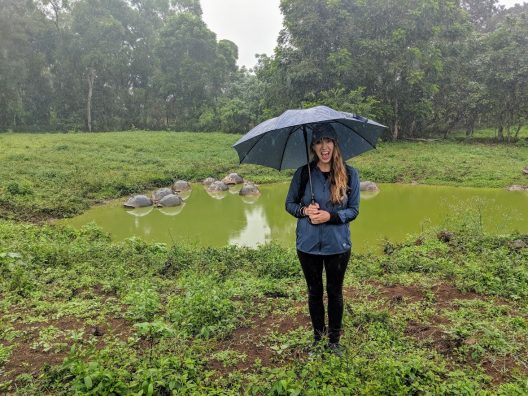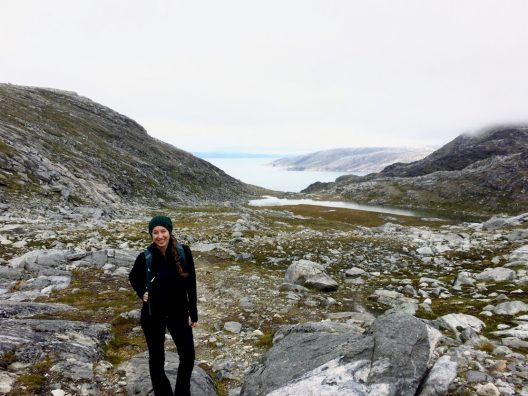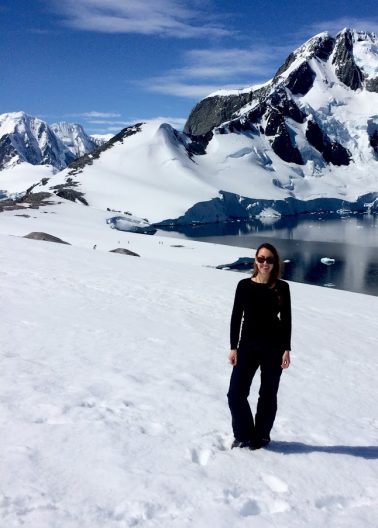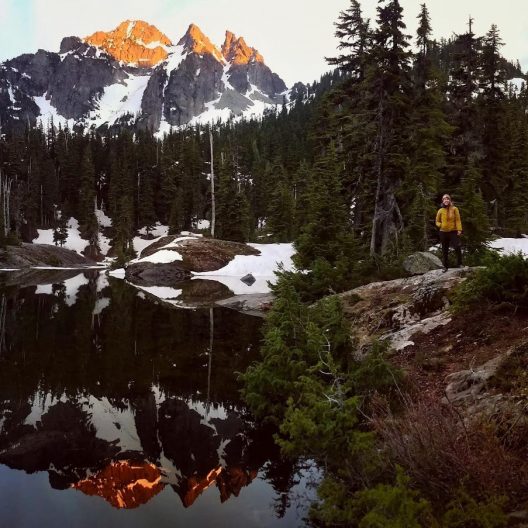Q&A with Olivia Zimmerman
Why did you decide to pursue a Master of Marine Affairs?
My journey to SMEA’s MMA program was a winding one. I never felt a clearly defined path to one field, but rather found myself vacillating between my interest in human psychology and my love of the natural world. I took several introductory courses in both fields during my early undergrad years, and ended up settling on a degree in psychology to study cognition and human decision making. In an elective course on oceans, I was introduced to the concept of shifting baselines syndrome which refers to human’s gradual accommodation of changes over time. In this course, I realized that human cognitive processes are actually deeply entwined with the environmental realm. I began doing research in a Conservation Psychology lab, which is a broad field studying human-nature relationships, at WWU. I knew that this was the field of study that I was passionate about and had always planned on returning to a graduate program to further my studies, but ended up taking a multi-year detour exploring different lifestyles and professions before ending up at SMEA.
Describe your experience in applying to and selecting a graduate program.

Prior to arriving at SMEA, I was working in the small ship expedition travel industry. I would occasionally have the opportunity to travel on these ships to remote destinations, and always felt both an indescribable appreciation of our astounding marine ecosystems as well as a growing anxiety about anthropogenic impacts. I had found many reasons (mostly financial) to continue delaying my return to graduate school over the years, but had kept a list of programs of interest throughout the country. I remember discovering the SMEA program just before a trip I had planned (and long dreamed of!) to East Africa. I decided to reflect during that trip and decide if this was the time for me to return to school since SMEA was the program that seemed most aligned with my interests and career goals. I spent my first week at a ‘backpackers and ecolodge’ called Distant Relatives in Kilifi, on the coast of Kenya. They were holding a permaculture seminar the week I was there, and the property is designed to support ecologically sustainable living. The hostel served as a community gathering space for locals, long-term researchers, and seminar students in addition to travelers, and I felt so deeply aligned with the philosophy of the space, and inspired by the people I had conversations with. I knew it was time for me to make my long awaited career change to begin working towards environmental solutions and applied to SMEA when I returned home. The human dimensions component of the program was the reason I selected SMEA. Humans have so many incredible solutions to climate change and knowledge of sustainable land practices. Now, we need a leadership that understands the urgency of implementing these goals and shifting our societal structure. SMEA prepares students to take on that task.

Tell us about your Capstone Project.
My capstone research is focused on enhancing environmental justice within a flood management and habitat restoration program called Floodplains by Design (FbD). This Washington State program is a public-private partnership that seeks to implement nature-based solutions to flooding and salmon recovery efforts. As the region experiences increased flood impacts from climate change, programs such as FbD can provide important funding and resources to communities living in or near flood-prone areas. Our capstone client, The Nature Conservancy, approached SMEA with interest in better understanding how the program can effectively increase equity. My cohort partner Tanya Eison and I were given a lot of agency to design our research as we saw fit (which we were both very grateful for!), and we are working with Tribal natural resource managers throughout the state to understand how FbD can elevate equity within the program as it relates to Indigenous peoples. Floodplains are tremendously important ecosystems, and provide critical habitat to a great many species. Our goal is to ask Tribal natural resource managers to define for themselves what is most important to their community and floodplain management goals, and how a program such as FbD can best support them. Within our relatively short research window, we seek to center Indigenous land management perspectives to support collaboration between FbD and Tribal communities, and hopefully more broadly to floodplain management efforts throughout the state.
What has been your favorite class at UW so far? Why?
My courses that have focused on social and environmental justice have been my most important, influential, and inspiring. The SMEA core curriculum provides a diverse foundation of coursework that has been enriching and will be key to success in the field, including policy design, climate change governance, marine science, and statistics, and for me these were all brought to light by the two courses I took that focused on decolonizing academia and enhancing equity in environmental work. One of these was a seminar called ‘Cultivating Inclusive Conservation Practices’ in SAFS which looked at the long history of racism and colonialism in US conservation efforts and explored antiracist approaches to conservation and restoration work, taught by Staci Amburgey. The other was SMEA’s 550D course during spring quarter called ‘Change Everything, Abolition Ecologies, and Indigenous People’s Self Determination’ taught by Isaac Rivera. Our readings explored topics such as abolition ecologies, Indigenous ways of knowing, and reciprocity in environmental management practices. These courses transformed my understanding of what environmentalism means and illustrated for me that conservation is not always the ideal. Often, we are not inclined to question the environment in which we are learning, where our sources of knowledge come from, and who decides what narratives we are immersed in. I believe that a strong understanding of decolonization and critical race theory is essential in professions that deal with environmental decision making. As the field takes on the urgency of climate change in management decisions, it will be vital to prioritize equity and these courses have helped me become a more informed advocate for environmental justice.

Tell us about how the COVID-19 pandemic has changed your SMEA experience. What does a daily routine look like for you?
I feel extremely fortunate to have had a safe and comfortable home from which I was able to attend Zoom courses over the past year. I also feel very fortunate to have made the decision to attend grad school before the pandemic went into full swing; it was painful to see the industry that I had so much appreciation for get hit so hard. Jobs in the travel industry were dramatically decreased over the course of the pandemic, and I recognize my great privilege in my (unbeknownst to me at the time) decision to make a career change in late 2019. Due to my circumstances prior to attending graduate school, my primary experience throughout Covid-19 has been extreme gratitude for the new doors opening to me. I recognize that there have been many lost opportunities to network, benefit from in-person classes, and meet my cohort, and I look forward to catching up on those experiences this academic year. However, I think that my instructors did a wonderful job transitioning courses into an online format, and I appreciate the guest lectures and events that were made so much more accessible by the digital world.
What do you like most about SMEA?
The range of expertise in SMEA is really quite striking to me. I am impressed by the faculty and staff in the program, each truly an expert in their field from my experience. It has been inspiring to take classes from instructors who have such interesting and varied careers in their field, and across such an array of disciplines.

What’s it like to live in Seattle? What do you do in your spare time?
Seattle has a lot to offer, and I am grateful to have been born and raised in the area. The main draw for me is the region’s incredible natural beauty. I do a lot of hiking, camping, paddling, beachcombing, and snow-sporting when free time allows. I also have a lot of appreciation for Seattle’s creative community. I am a huge music fan, a literary enthusiast, and I dabble in painting. Growing up in Seattle has provided ample opportunity for me to connect with live music, browse second-hand bookstores and attend readings, and be inspired by local artists. The food here is also wonderful. We have such delicious and diverse local restaurants and food trucks, and I constantly find new hidden gems. I am continually assessing my interest in long-term urban living but as far as cities go, it’s hard to beat Seattle.
If you could design your ultimate job after graduating, what would it be and why?
My dream job could manifest in many different places and roles, but I know that I am passionate about embracing the supreme intelligence of the natural world to tackle the current environmental crisis. Earth knows how to sustain life, take care of her systems, and respond with resilience to disturbances. The Western world’s current societal and physical infrastructure is in conflict with these natural relationships. My ideal career might be in some sort of consulting role that emphasizes holistic and reciprocal relationships with the planet while prioritizing a diversity of voices and equity for all people, especially in climate change adaptation and mitigation strategies. My goal is for my future career to support conservation efforts that are led by or in collaboration with Indigenous communities. We have so much to learn from holders of Indigenous knowledge, and my current coursework and research in environmental justice will provide helpful guidance for these goals.
What is your favorite form of marine life and why?
I have always been absolutely infatuated with cetaceans. Some of my earliest memories include devouring books about whales and dolphins, and encountering these incredible creatures in nature brings me to tears just about every time. Their magnificent size, astounding intelligence, intricate family structures, acoustic capacities, and playful nature are just endlessly fascinating to me. Each species has its own beautiful story, but I feel a particular affinity for our Southern Resident Killer Whales who reside in the waters of the Pacific Northwest and are intimately connected to so many of the marine issues that I am immersed in.